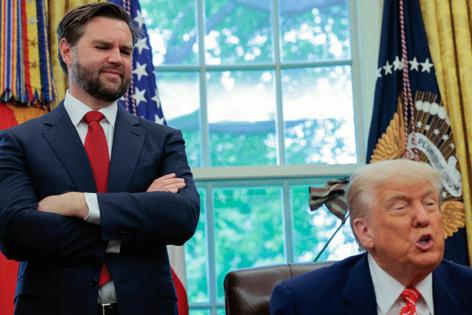JD Vance’s four words that might actually drain the swamp
VANCOUVER, British Columbia – “None of our business.” That’s not your uncle dodging a family feud. It’s U.S. Vice President JD Vance casually summing up America’s stance on nuclear-tipped tensions between India and Pakistan. Finally, a government official who knows how to mind his own business and doesn’t treat every foreign dust-up like it’s the Super Bowl of democracy and he's personally in charge of organizing a tailgate party.
On Fox News, Vance explained how the administration’s “watch but don’t touch” philosophy is kind of like a parent supervising toddlers with Nerf guns. “What we can do is try to encourage these folks to de-escalate a little bit,” he said, “but we’re not going to get involved in the middle of war that’s fundamentally none of our business and has nothing to do with America’s ability to control it.”
He was talking about a new flare-up in Kashmir – that little disputed slice of paradise between Pakistan and India where tourists go for the views and occasionally end up as collateral. After civilians were attacked in the Indian-controlled part of the zone last month, Trump posted: “The United States stands strong with India against Terrorism.”
But that “standing strong” didn’t mean drone strikes, regime changes or Halliburton contracts. Just literally standing. And watching. And mostly butting out for once. How refreshing.
Washington refrained from applying the “War on Terror” playbook, even though the group claiming the attack, Lashkar-e-Taiba (LeT), has alleged ties to Pakistan’s Inter-Services Intelligence. If this were some other time and place, the U.S. would have been knee-deep in the usual “nation-building” by now. But it almost never gets involved in dust-ups between New Delhi and Islamabad. Instead, it practices a policy of non-alignment which really ought to be applied much more widely.
Terrorism has long been America’s frequent flier pass to meddle everywhere from the Middle East to the Moon. But this time, not so much. It also helps that neither India nor Pakistan is lobbying Washington too hard with bulging briefcases full of campaign cash, and neither is particularly essential for Pentagon procurement. So, Team Trump basically did what any sensible adult does when two loud neighbors start arguing: shut the blinds and turn up the TV.
Vance’s outspoken bluntness about the need to butt out was a refreshing pivot from decades of sanctimonious speechifying from administrations about the need to do, well, the exact opposite. Team Trump did play peacemaker, but only behind the scenes, brokering a late-night ceasefire after both sides traded attacks. Looks like neutrality works better than the alternative.
So, could this be the new template? Is indifference the new intervention, and shrugging the new strategy?
All signs point to – well, maybe. If we’re lucky.
Look no further than the recent ejection of National Security Advisor Mike Waltz. According to the Washington Post, Waltz had been scheming with Israeli Prime Minister Benjamin Netanyahu, ultimately trying to tug Trump into a tangle with Iran. Trump wasn’t having it. Instead, he signed a surprise deal with Yemen’s Houthis – the same ones he’s been roasting for Red Sea terrorist hijinks targeting ships – and completely iced out Israel from the process.
And now Team Trump is cozying up to Iran like it’s 2015 again, with nuclear and trade talks bubbling back to the surface to ultimately replace the multilateral deal from which Trump withdrew unilaterally in his first term.
Suddenly, Israel’s incessant cries of “terrorism” are being sent straight to voicemail. It’s not too different from the treatment that India gets when it complains about Pakistan, or vice versa. And it’s a game-changer. Not just for the world, but for America’s political bloodstream, which has long been clotted with lobbyist cash.
This new Swiss-style neutral foreign policy seems to be catching on elsewhere on Team Trump's global chessboard, too. Exhibit A: Ukraine. Trump has taken to reminding everyone, often and loudly, that the conflict between Washington-led NATO and Russia, with Ukraine as the chosen parking lot for the punch-up, escalated under Biden. Not his circus, not his monkeys. And why pick sides when you can broker a deal and do business with both?
But handling Russia or Pakistan without frothing at the mouth isn’t exactly gutsy compared to telling Israel “no.” That’s really the final boss battle. Trump’s willingness to downgrade the special relationship to the level of business transactions like any others could fulfill one of his oldest promises to voters: draining the swamp in Washington.
Just how swampy is the swamp? According to The New Republic, one pro-Israel group spent a record $45 million influencing 65 percent of Congress in the 2024 election. That’s not even including the casino-sized $100 million that Miriam Adelson personally funneled into a Trump-aligned super PAC.
So what happens to all that cash – and that of other nations with similar ambitions – when it becomes clear that it yields poor value for money in shaping U.S. foreign policy and efforts to have Washington do their dirty work? Even better, what happens if Trump’s dealmaking, as a result of adopting an agnostic approach to countries that aren’t actually a threat to America itself, turns their enemies into America’s strategic partners on much the same level as them?
Sounds like it would all be a massive win for Trump, for American voters, and for world peace. But only if Trump’s team can keep its eyes on the prize and not get sucked back into the same foreign-funded Beltway groupthink that they claim to want to dismantle.

































Comments